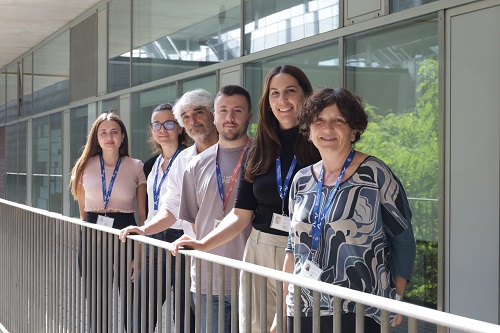
June 5th, 2024 - Press notes
A scientific team led by Dr Anna Bigas, from the Hospital del Mar Research Institute and the Josep Carreras Institute, has described the role of the IκBα protein in the differentiation process of haematopoietic cells.
In the absence of this protein, the stem cells enter quiescence, acquire a dormant state and maintain their potential, which may allow them to be transplanted for therapeutic uses in leukaemia or blood diseases of genetic origin.
This is an important step towards being able to generate these types of cells in the lab, preventing them from differentiating and turning into other cells too early.
Better tools for generating haematopoietic stem cells in the laboratory - the cells responsible for the generation and renewal of blood and the immune system - may open the door to new treatments for leukaemia or genetic blood diseases. These cells could be generated and transplanted into the patient, so they can develop into new cells and thus regenerate the blood. This is currently not possible, as they quickly differentiate and cease to have the properties that make them stem cells. However, a recent study published in the journal Nature Communications may change this. The study has been signed by researchers from the Hospital de Mar Research Institute, the Josep Carreras Leukaemia Research Institute, and the CIBER Cancer Research Centre (CIBERONC), and it was led by Dr. Anna Bigas.

The work has focused on the role of a protein, IκBα, which is involved in the regulation of inflammation, but also in the regulation of genes related to stem cells in tissues. To test its activity in blood, researchers studied its role in mouse embryos that had been modified to eliminate this protein. This allowed them to analyse how the absence of IκBα influenced the ability of haematopoietic stem cells to develop into mature blood cells or to remain in their initial state.
The study has shown that the number of haematopoietic stem cells generated in these IκBα-deficient embryos is low. Despite this, these cells keep their stem cell potential and their ability to develop into any blood cell. In fact, the results show that these cells have a high regenerative capacity once activated.
In the same study, researchers further explored the biological mechanisms that explain this phenomenon and found that IκBα reduces the levels of retinoic acid, which is essential in inducing a quiescent state in the cells, which means they remain inactive and do not differentiate. By eliminating IκBα, retinoic acid levels increase and this allows the cells to 'fall asleep' and so "we are enriching a population of cells that is normally very scarce, but which performs the function of the most primitive stem cell, the one that is most conserved, and lasts throughout life", explains Dr Bigas.
Despite being small in number, the haematopoietic stem cells in the modified embryos still had the potential to develop into other cells. Moreover, when transplanted, they were activated and differentiated. As Dr Bigas explains, "activating or inhibiting IκBα may provide us with a tool to control the characteristics of blood stem cells and help these cells to fall asleep and remain in the state in which they were generated. In the future, we may be able to induce embryonic cell differentiation into haematopoietic stem cells, prevent them from differentiating, and have them available for transplantation into a patient".
For the time being, the only viable source of this type of treatment is a donation from a healthy person. Therefore, this study allows progress towards "the ultimate goal, which is to generate haematopoietic stem cells in the laboratory so that they can be used in multiple applications, from direct transplantation of stem cells to patients with leukaemia, to treatment with gene therapy for other disorders", says the head of the study. Although the work has been carried out with mouse embryos, the researchers are optimistic that the results can also be transferred to human cells.
Thambyrajah, R., Maqueda, M., Fadlullah, M.Z. et al. IκBα controls dormancy in hematopoietic stem cells via retinoic acid during embryonic development. Nat Commun 15, 4673 (2024). https://doi.org/10.1038/s41467-024-48854-5
Parc Salut Mar
Passeig Marítim 25-29 Barcelona 08003
See location on Google maps
Phone: 93 248 30 00 · Fax: 93 248 32 54
Information request
© 2006 - 2025 Hospital del Mar · Legal notice and Privacy Police | Cookie Policy | Accessibility